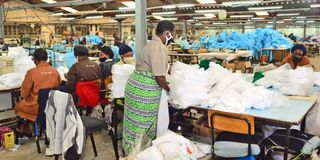Staff toil for less pay, says new report

Workers at Omega Apparels limited in Nairobi's Industrial Area. Findings by a new report indicate that in the manufacturing sector, 51 per cent of staff are paid between Sh500-600 per day, representing Sh12,000 monthly.
What you need to know:
- The findings by Open Institute show that 51 per cent of staff are paid between Sh500-600 per day, representing Sh12,000 monthly.
- More than five in 10 Kenyans working in the manufacturing sector grapple with poor job conditions
- The data was collected at Industrial Area’s Enterprise Road. Whereas 95 per cent of male complained of discrimination, only five per cent of women did the same.
- Most of the workers deemed themselves not to be unionised because unions could endanger their livelihood.
More than five in 10 Kenyans working in the manufacturing sector earn less than the recommended minimum wage of Sh13,572 per month, a new report shows, even as families’ grapple with Covid-19 economic hardships.
The findings by Open Institute show that 51 per cent of staff are paid between Sh500-600 per day, representing Sh12,000 monthly.
“Forty two per cent of the respondents said they work hard eight to nine hours a day, with two 10-15 minute breaks and get no compensation for the extra hours,” the report said.
Only 29 said they got personal protection equipments (PPE) with 71 not getting them, “and where it is provided, they are made to pay for it.”
“Only 40 per cent of the casual workers we spoke to had any form of basic insurance cover. This, coupled with the other issues highlighted, adds to the undue pressure and discomfort that the workers have to live through,” the report said.
Endanger their livelihoods
The data was collected at Industrial Area’s Enterprise Road. Whereas 95 per cent of male complained of discrimination, only five per cent of women did the same.
“The few women respondents expressed concerns about sexism, sexual harassment and the heavy manual nature of work that makes it difficult for them to work in the sector,” it adds.
The report reveals that many companies contravene the Kenya Employment Act (CAP 226), which compel employees to hire casuals permanently if they have worked for a firm for an extended period of time.
“All of the workers we interviewed are aware of the Central Organisation for Trade Unions, but they had no idea what it does for them - even though some of them claimed that a deduction made on their pay goes to the union.
“In fact, most of the workers deemed themselves not to be unionised because unions could endanger their livelihood,” it adds.





